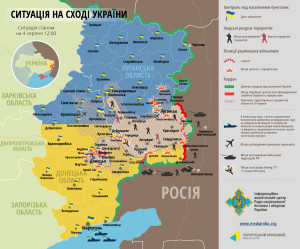Turning points: Syria and the Russian diplomacy. Stalingrad syndrome.
“Damascus is the “Stalingrad” of Russian diplomacy. After years of geopolitical withdrawal, Moscow has chosen Syria as a way to revive its image of power in the world. “Not one step back” is the Kremlin’s new strategy, as it was for the Red Army along the banks of the Volga river during World War II. To be more convincing, the Kremlin has simultaneously flexed its muscles by supplying sophisticated […]
A Minsk Ucraina, Russia ed OSCE hanno siglato un’intesa per il cessate il fuoco. L’obiettivo finale è quello di realizzare un piano di pace in 14 punti. I rappresentanti dei separatisti filo-russi erano presenti con uno status simile a qualcosa come osservatori. Kiev non ha così avuto necessità di riconoscerli formalmente.
PIANO PACE Poroshenko
- Garanzia di sicurezza per tutti i partecipanti ai negoziati.
- Esenzione da responsabilità penali per coloro che hanno deposto le armi e non hanno commesso gravi crimini.
- Liberazione dei prigionieri
- Creazione di zona cuscinetto, ampia 10 chilometri, al confine di stato ucraino-russo. Ritiro dei gruppi armati illegali.
- Corridoio sicuro di fuoriuscita per mercenari russi ed ucraini.
- Disarmo.
- Formazione di unità miste per il controllo del territorio.
- Sgombero degli edifici amministrativi in Donbass e Lugansk occupati illegalmente.
- Ripresa dell’attività degli organi politici locali.
- Ripresa trasmissioni radiotelevisive ucraine.
- Decentramento del potere (attraverso le elezioni degli organi esecutivi, difesa della lingua russa, emendamento della Costituzione nazionale).
- Nomina concordata dei governatori.
- Elezioni locali e parlamentari anticipate.
- Programma per la creazione di posti di lavoro.
“We Europeans must learn a lesson from the tragic Polish September, from the tragic years of the Second World War – tragic for all people without exception – that we cannot be naively optimistic. Today, looking at the tragedy of the Ukrainians, looking at the war – be1cause we need to use that word – we know that September 1939 cannot be allowed to be repeated” said Polish Prime Minister Donald Tusk. 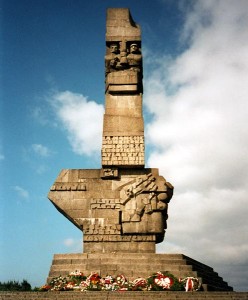
NATO member states will work towards “a new policy, whose main objective will be the security and effectiveness of our western community against the threat of war, not only in eastern Ukraine.”
It was on Gdansk’s small Westerplatte peninsula that the first shots of World War II were fired, with a small detachment of Polish soldiers attempting to withhold a siege from Nazi Germany.
Polish and German presidents Bronislaw Komorowski and Joachim Gauck met for the commemoration.
New EU appointments. The Gdansk wind.
31 Aug 2014The European Council has appointed Federica Mogherini as the next EU High Representative and Polish Prime Minister Donald Tusk as EU Council President.
Switzerland, new sanctions against Russia.
28 Aug 2014 In view of the situation in Ukraine, the Federal Council has today decided to take further measures to prevent the circumvention of international sanctions. It has amended the Ordinance of 2 April 2014 on measures to prevent the circumvention of international sanctions in relation to the situation in Ukraine to include the sanctions imposed by the EU in July. The revised ordinance enters into force at 6 pm today. 
During its discussions on the situation in Ukraine of 13 August 2014, the Federal Council decided to widen its current policy and to take all the measures required to ensure that the most recent sanctions imposed by the European Union cannot be circumvented via Swiss territory. Today the Federal Council decided on the necessary measures.
In the field of finance, issues of long term financial instruments by five Russian banks will be made subject to authorisation. In future, authorisation for new issues will only be granted if they are within the average financial engagement of the past three years. The subsidiaries of these Russian banks in Switzerland are exempt from the authorisation requirement as long as they are not acting on behalf of, or on the instructions of their parent companies. The EU’s restrictive measures also allow a similar exemption for subsidiaries of the Russian banks in question on its territory. Secondary trading in financial instruments newly issued outside Switzerland and the EU will be subject to a duty to notify. Eleven names have been added to the existing list of natural persons and businesses with whom financial intermediaries are prohibited from entering into new business relationships and whose existing business relations are subject to a duty to notify.
With regard to specific military goods and dual-use goods subject to licence, the Federal Council decided to add a further criterion for rejecting the application for an export licence to the existing list of criteria in goods control legislation. An application may now be refused if goods are intended to be used exclusively or partially for military purposes, or if they are intended for a military end user. With regard to war material, the Federal Council decided that a ban on imports of such goods from Russia and Ukraine should apply. The Federal Council also decided to introduce a duty to notify for exports of certain goods used in the extraction of oil in deep sea, Arctic or shale gas projects in Russia.
As a result of Switzerland’s decision not to recognise the annexation of Crimea by Russia constituing a breach of international law, the Federal Council has imposed a ban on imports and a ban on exports of certain key goods used in the extraction of oil and gas, as well as restrictions on investments for Crimea and Sevastopol.
The Federal Council has acknowledged the measures taken by Russia in respect of agricultural goods. It stresses that Switzerland is not engaged in any state measures to promote additional Swiss exports to Russia.
The Federal Council continues to monitor the situation in Ukraine closely and reserves the right to take further measures depending on how the situation develops.
Гробовое молчание
28 Aug 2014Имел разговор с одним «патриотом», не ярым, хорошим, в принципе, человеком, но все равно — «Крымнаш» со всеми вытекающими.
Я спросил: как это, мол, патриотично — не признавать своих погибших, раненых и пленных солдат? На что был такой ответ: но ведь Украина тоже свои реальные потери скрывает. 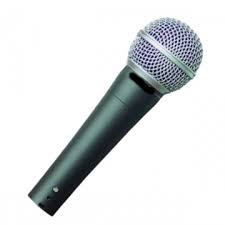
Это наверняка, война есть война, в том числе информационная, у нее свои законы.
Но и есть, как говорится, нюанс.
Украина, может, и не показывает в полном объеме цифры своих человеческих потерь, но ее армия воюет на своей территории, и в этом плане ей нечего скрывать.
Россия же воюет тайно, лжет всему миру (безрезультатно), лжет своим гражданам (все более бесстыдно), выкручивается, обманывает матерей пропавших без вести и погибших, рассказывает сказки про какие-то учения, в ходе которых с военными неделями не бывает связи, перебрасывает части на тысячи километров.
И — молчание, пипл вроде хавает.
Но вот всех-таки до людей наших праздничных начинают доходить (шила в жопе не утаишь) возможные перспективы такой патриотической лжеполитики.
Это не бравые новости, а мрачные «грузы 200», материнские слезы, вдовы и сироты, полные госпиталя раненых и десятки пленных.
Что делать в этой ситуации «патриотам» — не знаю.
Пусть решают для себя сами. Пока я не вижу грани между «патриотом» и лицемером. Но все-таки, надеюсь, она проявится. Не все же они, даже одурманенные телепропагандистами, конченые подонки. Есть и изначально порядочные люди, типа моего собеседника.
Надеюсь, такие люди, а их миллионы, наконец, прозреют.
Поймут, что патриотизм и откровенная ложь не могут сосуществовать в смеси: тут либо одно, либо другое.
Думайте быстрее, дамы и господа, обмотанные совершенно неуместными при подлой братоубийственной войне георгиевскими ленточками.
Люди гибнут не понарошку. Каждый час вашего пребывания без сознания — это новый труп. И вы невольно оказываетесь соучастниками убийства.
Blog – Ayder Muzhdabaev – Айдер Муждабаев – Facebook
Il tempo delle operazioni militari sta finendo per l’avvicinarsi dell’inverno; è venuta l’ora di una tregua fra gli ucraini; Mosca si prepari ad un serio negoziato.
È questo il messaggio recapitato a Kiev personalmente da Angela Merkel prima del summit a Minsk tra europei ed ex sovietici. In estrema sintesi, le parti in causa facciano un passo indietro e diano una chance alla pace. I presidenti russo Putin e ucraino Poroshenko avranno l’occasione di parlarsi a quattr’occhi o alla presenza di mediatori. Che sfruttino l’occasione! 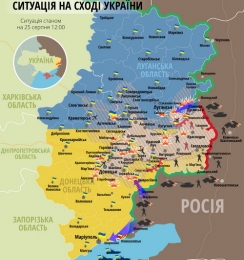
La cancelliera tedesca è stata chiarissima. Primo: l’Ucraina ha bisogno di “decentralizzare i poteri dello Stato” in modo da fornire garanzie alle regioni dell’Est, popolate da una maggioranza russofona. Secondo: Berlino e l’Unione europea doneranno “500 milioni di euro per l’immediata ricostruzione”. Terzo: non verrà riconosciuta l’annessione della Crimea da parte del Cremlino. Quarto: se la situazione non migliorerà rapidamente “non sono escluse nuove sanzioni” contro la Russia, alla quale non verranno fatte concessioni, poiché la crisi è troppo pericolosa. Nelle settimane passate la Merkel ha definito Putin un uomo che vive “in un altro mondo”.
Berlino è in realtà preoccupata che con l’approssimarsi della stagione fredda Mosca possa iniziare a giocare con le forniture del gas. L’Unione europea dipende per un 30% circa del suo fabbisogno dalla russa Gazprom. Approssimativamente l’80% di questi approvvigionamenti transitano in Ucraina. Per ora le reazioni anti-occidentali del Cremlino sono state spuntate e ad uso della propaganda interna.
Sul piano militare i governativi di Kiev hanno riconquistato gran parte delle due regioni ribelli, costringendo i separatisti ad asserragliarsi nelle tre città di Donetsk, Gorlovka e Lugansk. Non riescono per ora solo a sigillare la frontiera per evitare l’arrivo di uomini freschi e armi in soccorso.
Kiev non pare, tuttavia, avere unità speciali sufficienti per snidare in fretta nei centri urbani quelle poche migliaia di guerriglieri delle due Repubbliche popolari presenti.
E il tempo, adesso, gioca contro di lei: l’autunno e il rigido inverno sono alle porte. Gran parte della popolazione è fuggita dalle zone del conflitto: la sua stragrande maggioranza è ospite di parenti o amici; in percentuale in pochi sono nei campi profughi. Le vacanze, forzatamente cominciate a giugno, devono finire, anche perché i soldi iniziano a scarseggiare.
La gente, sia a Lugansk che a Donetsk, non ne può più: vuole la fine della guerra civile. I pochi che avevano dimostrato supporto per i separatisti, si sono diradati. I ribelli stanno distruggendo le infrastrutture per provocare una crisi umanitaria, che, per il momento, non esiste a Donetsk, ma si intravede a Lugansk città. Quella è una delle poche carte restate loro in mano.
A Minsk, in conclusione, vi sarà il tentativo di trovare una soluzione, facendo uscire tutti dalla crisi con la faccia pulita…o quasi.
Giuseppe D’Amato
“Макдоналдс” как начало агонии.
24 Aug 2014Как быстро всё покатилось. По-французски выражаясь, бистро́.
“Наш ответ Западу” в виде гражданской войны с “Макдональдсом” (компанией, долгие годы “поднимающей с колен” отечественное производство мяса и овощей, дающей работу многим тысячам россиян) – четко осязаемое начало агонии, смысловой Рубикон. 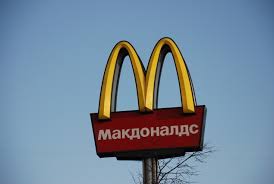
Не имея сколько-нибудь серьезных рычагов экономического давления на Западный мир, мы ведем себя, как маленький хулиган, наделавший кучку у ворот приличного дома и давший деру.
Глупо выглядим, плохо пахнем. На нас изумленно смотрят из окон и крутят вслед пальцами у виска. Некоторые переживают — а ну как несчастный мальчик так с разбегу ударится, что начнет есть собственные какашки? Но, похоже, поздно, мальчик уже вымазал пальчик.
Никакие Вообразилии его с ложечки человеческой едой не накормят, машинку не подарят. Что нормальному человеку в жизни важнее — дружба с одиноким чокнутым мальчиком или с компанией взрослых вменяемых людей? Для тех, кто еще не поел какашечек, ответ очевиден.
Лечение даже не будет особо долгим. Собственно, оно уже началось. Высокие цены не нефть испускают газы, все внутри страны дорожает, правители судорожно отменяют санкции на молоко и мальков, а мальчик настолько плох, что даже не способен сообразить: почти все, что у него есть, — чужое. Кроме мании величия, разумеется.
Что будет дальше? А вот что, послушай, мальчик.
Скоро взрослые укажут тебе номер соответствующей палаты и проведут курс интенсивной терапии. Твой папа однажды так уже вылечился. Но медицина, дружок, не стоит на месте, тебе помогут стать здоровым быстрей.
Blog – Ayder Muzhdabaev – Айдер Муждабаев – Facebook
23 августа 1939 года гитлеровская Германия и Советский Союз заключили договор о ненападении. Со стороны СССР его подписал нарком по иностранным делам Вячеслав Молотов, со стороны Германии – министр иностранных дел Иоахим фон Риббентроп (Joachim von Ribbentrop). К договору прилагался секретный дополнительный протокол о разграничении сфер обоюдных интересов в Восточной Европе. 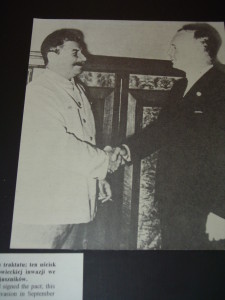
Неделю спустя – 1 сентября 1939 года – Германия вторглась на территорию Польши, а 17 сентября 1939 года на территорию Польши вошли советские войска. Позже к СССР были присоединены страны Балтии, Бессарабия, Северная Буковина и часть Финляндии.
Этот договор обычно называют “пактом Молотова-Риббентропа”, а в Германии – “пактом Гитлера-Сталина” (Hitler-Stalin-Pakt).
День памяти
После нападения Германии на Советский Союз 22 июня 1941 года “пакт Молотова-Риббентропа”, так же как и все остальные советско-германские договоры, утратил силу.
В 1989 году Съезд народных депутатов СССР осудил секретный дополнительный протокол к договору и признал его недействительным с момента подписания. С недавнего времени 23 августа является Днем памяти жертв сталинизма и нацизма.
Deutsche Welle
La tragedia dell’irresponsabilità delle leadership, degli Stati che perdono il loro ruolo guida nella comunità internazionale, dei nuovi membri Ue che utilizzano la “casa comune europea” come un condominio per saldare vecchi conti col passato sovietico. Queste sono solo alcune delle componenti che hanno concorso a provocare l’abbattimento del Boeing malese oltre al permesso di far volare un aereo civile sopra ad una zona di guerra. 
Adesso siamo di fronte al classico “casus belli”. Proprio nell’anno in cui si è ricordato con terrore l’attentato del 28 giugno 1914 a Sarajevo. Un incendio, per ora limitato ad un paio di regioni, potrebbe diventare gigantesco se chi di dovere non si ergerà a pompiere.
La guerra del Donbass e di Lugansk, nella terribile realtà dei fatti, non interessa quasi a nessuno. Era già un conflitto dimenticato dai grandi mass media mondiali. La Russia ha perso da un pezzo la partita di creare la “Novaja Rossija”, una fascia che dal suo confine arriva fino ad Odessa. Gli occidentali tremano invece al pensiero di iniziare a spedire miliardi in serie per riconvertire un’economia locale non concorrenziale con i livelli europei. Restano solo i governativi ucraini che a fatica non riescono ad avere la meglio di 10-12mila miliziani, rafforzati da abili professionisti venuti da fuori.
Ora il dramma del Boeing, proprio mentre la diplomazia attendeva stancamente il ritorno del Donbass e di Lugansk sotto l’egida di Kiev per aprire il vero negoziato.
Il nocciolo del problema è rappresentato dal futuro della Crimea, dai rapporti russo-ucraini, da quelli russo-europei ed americani. Che cosa si vuole fare? Isolare Mosca?
L’obiettivo finale, ci raccontavano diplomatici occidentali, è quello di ridimensionare la Russia geopoliticamente ed economicamente. Il progetto euroasiatico – Europa più Russia – per il mondo globalizzato del XXI secolo è fallito. Ecco perché il Cremlino ha volto lo sguardo verso la Cina, che timorosamente ha accettato il corteggiamento, non dimenticando tuttavia la sua complessa relazione con gli Stati Uniti. Le forniture russe al Vecchio Continente nell’arco di 2-3 anni verranno ridotte a vantaggio degli approvvigionamenti di “shale” gas e petrolio americano. Immaginabili le conseguenze per il budget di Mosca!
Al momento solo tanta intelligenza e calma servono per uscire da questa complicatissima situazione. L’immediata tregua fra le parti in conflitto e l’inizio di serie trattative appaiono indispensabili. Ma per evitare di discutere sul nulla sono necessari atti politici da parte di Kiev con la definizione di un documento – da far entrare nella futura Costituzione – in cui vengano definiti i poteri delle autonomie locali e vengano accordate garanzie sull’uso delle lingue.
Ma perché poi la Nato non dichiara una volta per tutte che l’Ucraina non sarà suo membro per i prossimi 50 anni? E che i suoi piani anti-missilistici in Europa coinvolgeranno in futuro anche la Russia, non appena raggiungerà livelli più democratici interni?
A Vladimir Putin non resterà così che prendere atto che il mondo con le sfere di influenza non esiste più.
Giuseppe D’Amato
Welcome
We are a group of long experienced European journalists and intellectuals interested in international politics and culture. We would like to exchange our opinion on new Europe and Russia.
Categories
- Breaking News (11)
- CIS (129)
- Climate (2)
- Energy&Economy (115)
- EU Eastern Dimension (85)
- Euro 2012 – Sochi 2014 – World Cup 2018, Sport (43)
- Euro-Integration (135)
- History Culture (198)
- International Policy (261)
- Military (74)
- Interviews (18)
- Italy – Italia – Suisse (47)
- Odd Enough (10)
- Poland and Baltic States (126)
- Religion (31)
- Russia (421)
- Survey (4)
- Turning points (4)
- Ukraine (176)
- Российские страницы (113)
Archives
- November 2020
- October 2020
- September 2020
- August 2020
- July 2020
- May 2020
- April 2020
- March 2020
- January 2020
- December 2019
- November 2019
- October 2019
- September 2019
- August 2019
- July 2019
- June 2019
- May 2019
- April 2019
- March 2019
- February 2019
- December 2018
- November 2018
- October 2018
- September 2018
- August 2018
- July 2018
- June 2018
- May 2018
- April 2018
- March 2018
- February 2018
- January 2018
- December 2017
- November 2017
- October 2017
- September 2017
- August 2017
- July 2017
- May 2017
- March 2017
- January 2017
- December 2016
- November 2016
- October 2016
- September 2016
- July 2016
- June 2016
- May 2016
- April 2016
- February 2016
- January 2016
- November 2015
- October 2015
- September 2015
- June 2015
- April 2015
- March 2015
- February 2015
- January 2015
- December 2014
- November 2014
- October 2014
- September 2014
- August 2014
- July 2014
- June 2014
- May 2014
- April 2014
- March 2014
- February 2014
- January 2014
- December 2013
- November 2013
- October 2013
- September 2013
- August 2013
- July 2013
- June 2013
- May 2013
- April 2013
- March 2013
- February 2013
- January 2013
- December 2012
- November 2012
- October 2012
- September 2012
- August 2012
- July 2012
- June 2012
- May 2012
- April 2012
- March 2012
- February 2012
- January 2012
- December 2011
- November 2011
- October 2011
- September 2011
- August 2011
- July 2011
- June 2011
- May 2011
- April 2011
- March 2011
- February 2011
- January 2011
- December 2010
- November 2010
- October 2010
- September 2010
- August 2010
- July 2010
- June 2010
- May 2010
- April 2010
- March 2010
- February 2010
- January 2010
- December 2009
- November 2009
- October 2009
- September 2009
- August 2009
Our books





